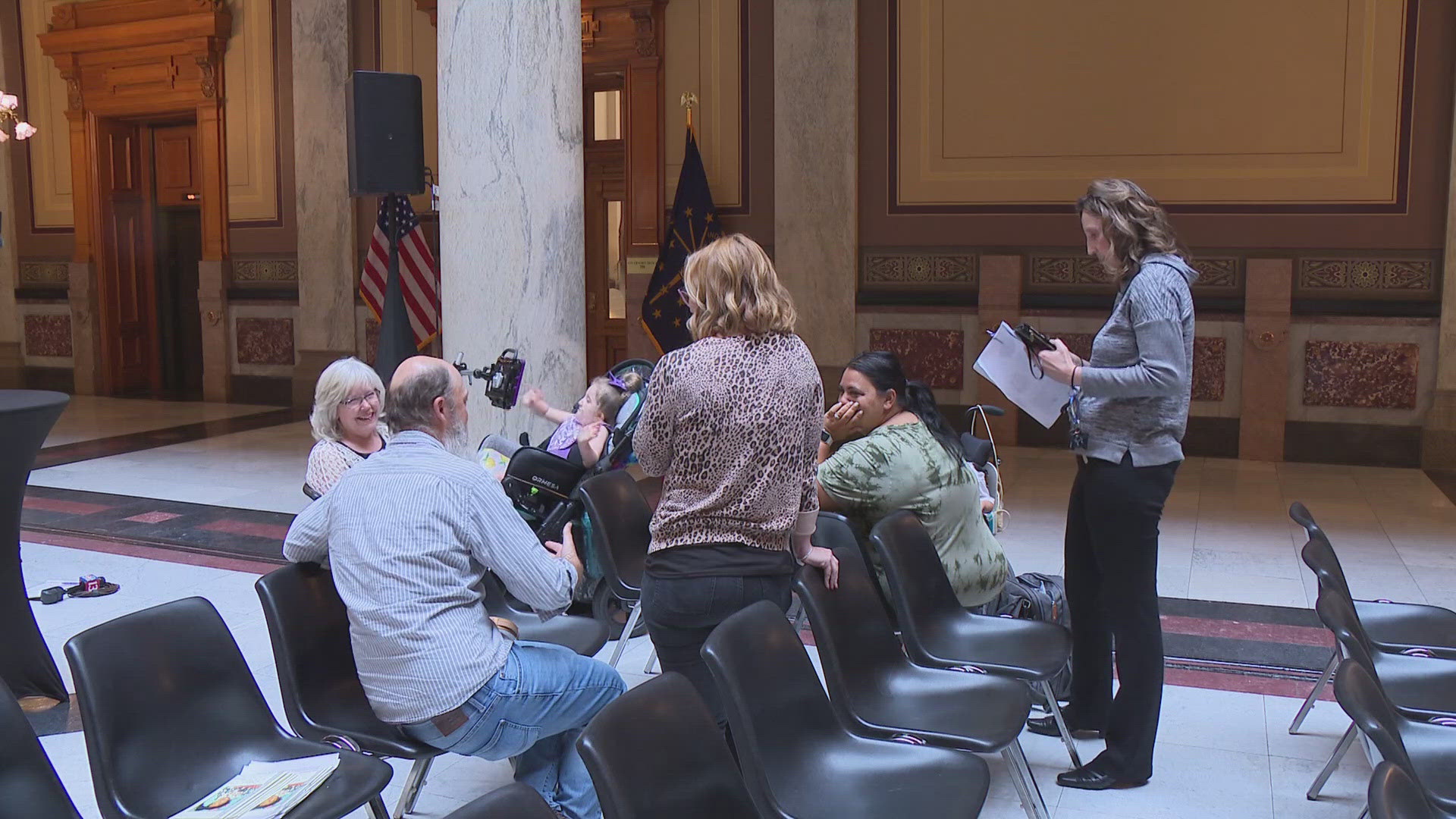INDIANAPOLIS — A budget shortfall within the Family Social Services Administration could mean major cuts for the families of "medically-complex children." The cuts would impact how they care for their children.
On Monday, “Indiana Families United for Care” met with Gov. Eric Holcomb and FSSA Secretary Dr. Daniel Rusyniak at the statehouse.
It’s the first in-person meeting since the cuts were announced in January.
In the meeting, they discussed concerns about waiver transitions and the transition from attendant care to structured family caregiving.
The group of six moms handed over a list of requests, including an FSSA ombudsman and a 90-day delay in implementing changes.
They said the governor would give them a response by the end of the week.
“We really appreciate that they finally took the time to meet with us, although we wish we had this opportunity sooner to let them know about the issues that we are having. But it is better late than never,” said Jennifer Dewitt, a mom and caregiver of a medically-complex child, who organized the meeting.
Holcomb issued a response to a 13News request for comment on the meeting:
“I listened carefully and appreciated the moms bringing their concerns forward. They obviously only want the best for their children. Dr. Rusyniak was with me during the meeting, and we’ll consider the issues they raised as well as changes we can make to better communicate with impacted families.”
Parents of medically-complex kids have been fighting for answers since January. That’s when cuts were announced to the state’s “Attendant Care Program” because of a budget shortfall.
The program paid parents an hourly rate to care for their kids at home. FSSA now wants to switch them to a different program that would give them a daily stipend, which would only go toward hiring a medical professional like a nurse.
If a parent wanted to be a caregiver, they would no longer get reimbursed.
With 62 days left before the transition, families say there’s no tool yet to adequately assess their child’s tier for the new program.
“We are here to make the best decisions we possibly can for our children, and there is an approximately nine-step process for us to be able to make that transition from attendant care to structured family care, and right now, we are stuck on step one,” Dewitt said.
Families left Holcomb with a 20-page report and a survey from nearly 250 families.
“We hope that sharing this information today will enable them to get us that information quicker,” Dewitt said.
On Thursday, we got an update from the families who met with the governor.
We learned that two requests presented during that meeting will be included in the transition from "attendant care" to "structured family caregiving." The group tells us that news came during a recent FSSA webinar.
A spokeswoman for Indiana United Families For Care calls the news "incredibly encouraging" but said more progress is needed.
Lt. Gov. Suzanne Crouch released a statement earlier this week:
“First, I appreciate that Gov. Holcomb and Sec. Rusyniak finally met with families who are being impacted by the transition from the state’s Attendant Care Program to Structured Family Caregiving. This group submitted 10 recommendations to Sec. Rusniak and the governor today. Careful consideration of these recommendations is the least Gov. Holcomb and FSSA can do at this point. There are 62 days to make necessary adjustments to help give some of these families not only the hope but the help they need. I sincerely hope that these families can get answers by this Friday on the recommendations submitted to FSSA. As I have since January, I stand ready to help in any way possible. We in Indiana will be judged by how we care for the most vulnerable among us.”
List of requests from “Indiana Families United for Care”
Changes include asking FSAA to:
- Cease holding Notice of Action (NOA) approvals hostage for other waiver services as a way to force Attendant care hours down prior to July 1. For ex: home modifications, specialized equipment and generators;
- Provide families with the evaluation tool that FSSA has instructed case managers (CMs) to use when evaluating for SFC tiers. In the case this tool has not been released, provide a date when that is expected and does the recommended tool consider the medical complexity of the patient outside of just the activities of daily living (ADL) and instrumental activities of daily living (AIDL) factors;
- Appoint a designated Ombudsman to assist with ATTC/SFC related transition issues and have said Ombudsman’s contact information posted publicly on the Medicaid Strategies webpage;
- Embargo the requirement for personal assistance (PA) hours until July 1, 2024 due to lack of communication and notification BY FSSA to members, CM’s and providers to allow for all parties to work through the process of getting these in place. Home Care Agencies are informing us that this is a six to ten week process to get these written, approved and staffed.
- Implement a 90-day delay on implementation in order to provide clarity to families, CMs and SFC providers concerning the SFC evaluation process, final approval for the more than 300 new SFC provider applicants and allow families the time to interview agencies for appropriateness.
- Post an FAQ with responses based on the questions that families ask on interactive webinars to be accessible on the Medicaid Strategies webpage when waiver services are denied, proper written notification be provided for families within five business days of notifying the case manager.
- To, when waiver services are denied, proper written notification be provided for families within five business days of notifying the case manager.
- Publicly post the version of the Health and Wellness, Traumatic Brain Injury, and Pathways waivers that were submitted to CMS for approval.
- Allow respite nursing service for families choosing SFC that FSSA reconsider allowing access to ATTC with an appropriate evaluation tool, guidelines, guardrails, and a limit on LRI provided hours.

